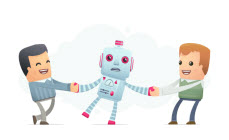If you are putting out fires already with coworkers not getting along, you may not want to read this article. You may soon be refereeing among your employees and the robot working in your company. And you thought artificial intelligence means no problems!
 |
Yes, The Robot on “Lost in Space” often had the best lines with his cheeky comments, but even if your robots do not speak, their actions may give rise to some conflicts with their human counterparts. Why? According to a report in Business Insider Australia, Bill Gates predicts that people may fear for their jobs when robots become more intelligent than employees, and there is “software substitution for labor.” Naturally jealousy—and fear—will result.
And employees may have good reason to fear their “collaborative robots”—now coined “co-bots,” says Financial Times. FT reports that “companies have been rushing to develop co-bots, which can work side-by-side with employees” [emphasis added]. These robots, which have better vision and better accuracy and dexterity than humans, will be used to lower labor costs, reduce safety issues and accidents, and address labor shortages caused by retiring Baby Boomers, according to FT.
Co-bots also do not gossip, waste time online, or make a mess in the lunchroom. And the development of lower-cost robots, that have a larger variety of movements that do not require extensive programming and sell for around $30,000, make them affordable and justifiable not only for corporations, but for small- to medium-sized companies as well.
But when these robots never make a mistake—or complain—it may be too much for their human counterparts. Despite what FT calls “the excitement over human-machine collaboration,” you know you will have employees ending up in your office complaining about their infallible—and annoying—co-bot coworkers.

I’m sure employees will find robots in the workplace threatening. It wouldn’t surprise me if some even tried to sabotage them.